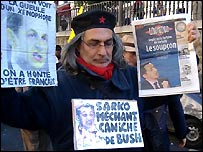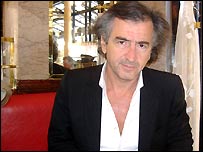<font size="5"><center>'Death to US': Anti-Americanism examined</font size><font size="4">
The US is perceived by many as an international bully,
a modern day imperial power. At this critical moment in
history, Washington correspondent Justin Webb challenges that idea.
He argues anti-Americanism is often a cover for hatreds with little
justification in fact. His three part series takes him to Cairo, Caracas
and Washington but it begins where anti-Americanism began - in Paris. </font size></center>
BBC News
Thursday, 12 April 2007
In the Abbey Churchyard in the lovely English city of Bath, groups of demonstrators, many - though not all - of them Quakers, regularly gather to protest against the iniquities of the world.
My dear mother Gloria Webb, who died last year, was one of the protesters. In her day, she was an energetic duffle-coated figure who wanted to ban the bomb, stop wars of all kinds and suffering anywhere.
She was a wonderful person, my mum, and so were her friends. Yet it always struck me, when she told me about these protests (and when, I freely confess, I attended them with enthusiasm as a youngster) that there was an odd one-sidedness to the game.
The protests against nuclear weapons, for instance, concentrated on American weapons. The anti-war rallies were against American-led wars. The anti death penalty campaign focused on Texas.
A pattern was emerging and has never seriously been altered. A pattern of willingness to condemn America for the tiniest indiscretion - or to magnify those indiscretions - while leaving the murderers, dictators, and thieves who run other nations oddly untouched.
In the beginning
And if anti-Americanism is alive and well among surprisingly mild-mannered people in Britain - how much more virulent must it be in tougher parts of the world?

Criticism of American power and
American life lives on in Paris
To find out, I have visited Venezuela, where the nation's leader Hugo Chavez compares George W Bush to Hitler, and Egypt, where the regime warns of a tide of stars and stripes burning if its hold on power is weakened.
And Paris. Paris? Yes Paris - where it all began.
Anti-Americanism was born in France. And here's a fascinating fact: it was born well before the United States existed. It was not caused by Coca-Cola, or McDonald's, or Hollywood or George W Bush.
The prevailing view among French academics throughout the 18th Century was that the New World was ghastly. It stank, it was too humid for life to prosper. And, as one European biologist put it: "Everything found there is degenerate or monstrous."
In their heart of hearts, many French people still believe that to be true.
A French intellectual once compared the United States with Belgium. Wounding. But you see what he meant: the French capital has a grandeur about it that demands attention on the world stage. Belgium does not, nor does most of America.
Washington is grand but Washington was designed by a Frenchman and his vision didn't fit the rest of the nation. America is ordinary. Go on say it out loud on the streets of Paris: "America is ordinary". It celebrates the pursuit of small-scale happiness - in families and communities - and that is what the anti-Americans can't stand.
Dislike
In the heart of Paris, there is the Avenue Franklin Roosevelt. Roosevelt, the man who helped defeat Nazi Germany and liberate Parisian streets, is celebrated here. And the point many French people make is that they would celebrate George W Bush, too, if they agreed with him. The source of anti-Americanism is plain they say. As one interviewee told us: "It's the policies, Stupid."
Well up to a point: in Paris there is plenty of evidence to be found that anti-Americanism is way more than that, that it's not simply reasonable opposition to the things America does.
The kind of anti-Americanism fostered by French intellectuals down the centuries revolves around intense dislike of what America is - not what it does.
Sitting in the Cafe de Flore, in the very seat where Jean-Paul Sartre once held sway, the self-described writer and philosopher Bernard-Henri Levy puts it like this: America became the nightmare that French right-wing intellectuals long feared, a nation built not on respectable ties of blood and tradition but on the self-conscious desire to create something new.

Bernard-Henri Levy says more
balance is needed in the French
debate on America
Antagonism
Levy is sympathetic to the US, and a book he wrote on his travels there, American Vertigo, is a balanced and thoughtful piece of work.
But such balance is, according to Levy, missing in the French political debate on American power and American life. He describes a process whereby this antagonism to the fundamentals of the USA - to the kind of democracy that celebrates and encourages ordinariness - migrates hither and thither in the French body politic.
It began on the right but now in the shape of Jose Bove (the anti-McDonald's campaigner, and presidential candidate) and other luminaries of the left, it lives on.
And this is not a recent migration brought on by Mr Bush. In May 1944 (just weeks before American GIs landed on the beaches of Normandy), Hubert Beuve-Mery, the founder of Le Monde newspaper - certainly no mouthpiece of the right - wrote this: "The Americans represent a real danger for France, different from the one posed by Germany or the one with which the Russians may - in time - threaten us. The Americans may have preserved a cult of Liberty but they do not feel the need to liberate themselves from the servitude which their capitalism has created. "
It is time that we understood that this attitude, this contempt for what democracy can do, is at the heart of at least some of the anti-Americanism we see in the world today.
"Death to America": Anti-Americanism examined will be broadcast on Radio 4 over three weeks starting on 16 April at 2000 BST.
http://news.bbc.co.uk/2/hi/americas/6547881.stm
The US is perceived by many as an international bully,
a modern day imperial power. At this critical moment in
history, Washington correspondent Justin Webb challenges that idea.
He argues anti-Americanism is often a cover for hatreds with little
justification in fact. His three part series takes him to Cairo, Caracas
and Washington but it begins where anti-Americanism began - in Paris. </font size></center>
BBC News
Thursday, 12 April 2007
In the Abbey Churchyard in the lovely English city of Bath, groups of demonstrators, many - though not all - of them Quakers, regularly gather to protest against the iniquities of the world.
My dear mother Gloria Webb, who died last year, was one of the protesters. In her day, she was an energetic duffle-coated figure who wanted to ban the bomb, stop wars of all kinds and suffering anywhere.
She was a wonderful person, my mum, and so were her friends. Yet it always struck me, when she told me about these protests (and when, I freely confess, I attended them with enthusiasm as a youngster) that there was an odd one-sidedness to the game.
The protests against nuclear weapons, for instance, concentrated on American weapons. The anti-war rallies were against American-led wars. The anti death penalty campaign focused on Texas.
A pattern was emerging and has never seriously been altered. A pattern of willingness to condemn America for the tiniest indiscretion - or to magnify those indiscretions - while leaving the murderers, dictators, and thieves who run other nations oddly untouched.
In the beginning
And if anti-Americanism is alive and well among surprisingly mild-mannered people in Britain - how much more virulent must it be in tougher parts of the world?

Criticism of American power and
American life lives on in Paris
To find out, I have visited Venezuela, where the nation's leader Hugo Chavez compares George W Bush to Hitler, and Egypt, where the regime warns of a tide of stars and stripes burning if its hold on power is weakened.
And Paris. Paris? Yes Paris - where it all began.
Anti-Americanism was born in France. And here's a fascinating fact: it was born well before the United States existed. It was not caused by Coca-Cola, or McDonald's, or Hollywood or George W Bush.
The prevailing view among French academics throughout the 18th Century was that the New World was ghastly. It stank, it was too humid for life to prosper. And, as one European biologist put it: "Everything found there is degenerate or monstrous."
In their heart of hearts, many French people still believe that to be true.
A French intellectual once compared the United States with Belgium. Wounding. But you see what he meant: the French capital has a grandeur about it that demands attention on the world stage. Belgium does not, nor does most of America.
Washington is grand but Washington was designed by a Frenchman and his vision didn't fit the rest of the nation. America is ordinary. Go on say it out loud on the streets of Paris: "America is ordinary". It celebrates the pursuit of small-scale happiness - in families and communities - and that is what the anti-Americans can't stand.
Dislike
In the heart of Paris, there is the Avenue Franklin Roosevelt. Roosevelt, the man who helped defeat Nazi Germany and liberate Parisian streets, is celebrated here. And the point many French people make is that they would celebrate George W Bush, too, if they agreed with him. The source of anti-Americanism is plain they say. As one interviewee told us: "It's the policies, Stupid."
Well up to a point: in Paris there is plenty of evidence to be found that anti-Americanism is way more than that, that it's not simply reasonable opposition to the things America does.
The kind of anti-Americanism fostered by French intellectuals down the centuries revolves around intense dislike of what America is - not what it does.
Sitting in the Cafe de Flore, in the very seat where Jean-Paul Sartre once held sway, the self-described writer and philosopher Bernard-Henri Levy puts it like this: America became the nightmare that French right-wing intellectuals long feared, a nation built not on respectable ties of blood and tradition but on the self-conscious desire to create something new.

Bernard-Henri Levy says more
balance is needed in the French
debate on America
Antagonism
Levy is sympathetic to the US, and a book he wrote on his travels there, American Vertigo, is a balanced and thoughtful piece of work.
But such balance is, according to Levy, missing in the French political debate on American power and American life. He describes a process whereby this antagonism to the fundamentals of the USA - to the kind of democracy that celebrates and encourages ordinariness - migrates hither and thither in the French body politic.
It began on the right but now in the shape of Jose Bove (the anti-McDonald's campaigner, and presidential candidate) and other luminaries of the left, it lives on.
And this is not a recent migration brought on by Mr Bush. In May 1944 (just weeks before American GIs landed on the beaches of Normandy), Hubert Beuve-Mery, the founder of Le Monde newspaper - certainly no mouthpiece of the right - wrote this: "The Americans represent a real danger for France, different from the one posed by Germany or the one with which the Russians may - in time - threaten us. The Americans may have preserved a cult of Liberty but they do not feel the need to liberate themselves from the servitude which their capitalism has created. "
It is time that we understood that this attitude, this contempt for what democracy can do, is at the heart of at least some of the anti-Americanism we see in the world today.
"Death to America": Anti-Americanism examined will be broadcast on Radio 4 over three weeks starting on 16 April at 2000 BST.
http://news.bbc.co.uk/2/hi/americas/6547881.stm


 manure
manure